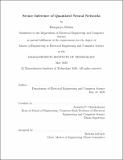Secure inference of quantized neural networks
Author(s)
Mehta, Haripriya(Haripriya P.)
Download1192967539-MIT.pdf (1.131Mb)
Other Contributors
Massachusetts Institute of Technology. Department of Electrical Engineering and Computer Science.
Advisor
Anantha P. Chandrakasan.
Terms of use
Metadata
Show full item recordAbstract
Running image recognition algorithms on medical datasets raises several privacy concerns. Hospitals may not have access to an image recognition model that a third party may have developed, and medical images are HIPAA protected and thus, cannot leave hospital servers. However, with secure neural network inference, hospitals can send encrypted medical images as input to a modified neural network that is compatible with leveled fully homomorphic encryption (LHE), a form of encryption that can support evaluation of degree-bounded polynomial functions over encrypted data without decrypting it, and Brakerski/Fan-Vercauteren (BFV) scheme - an efficient LHE cryptographic scheme which only operates with integers. To make the model compatible with LHE with the BFV scheme, the neural net weights, and activations must be converted to integers through quantization and non-linear activation functions must be approximated with low-degree polynomial functions. This paper presents a pipeline that can train real world models such as ResNet-18 on large datasets and quantize them without significant loss in accuracy. Additionally, we highlight customized quantize inference functions which we will eventually modify to be compatible with LHE and measure the impact on model accuracy.
Description
Thesis: M. Eng., Massachusetts Institute of Technology, Department of Electrical Engineering and Computer Science, May, 2020 Cataloged from the official PDF of thesis. Includes bibliographical references (pages 63-65).
Date issued
2020Department
Massachusetts Institute of Technology. Department of Electrical Engineering and Computer SciencePublisher
Massachusetts Institute of Technology
Keywords
Electrical Engineering and Computer Science.